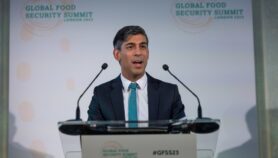By: Eva Aguilar
Send to a friend
The details you provide on this page will not be used to send unsolicited email, and will not be sold to a 3rd party. See privacy policy.
The UN secretary-general, Ban Ki-Moon, has called for more scientific research to develop biofuels and other renewable and alternative energy sources.
Biofuels "hold great promise" he told journalists this week (11 November) during a visit to Brazil.
But he said that "although scientists need to be creative in research and development", food security and other issues related to the environment need to be looked at and "it will be healthy to have a broad debate and research on this matter."
"Clearly biofuels have great potential for good and, perhaps, also for harm. It is up to national governments to responsibly balance the social costs and benefits," Ki-Moon added.
His comments come at a time of controversy over the impact of biofuels on food security and the environment.
On 25 October, the UN’s special rapporteur on the Right to Food, Jean Ziegler, reported to the UN Third Committee (Social, Humanitarian and Cultural) that turning crops into fuel for cars is increasing the prices of food and resulting in more hunger.
Ziegler told the committee that "It is a crime against humanity to convert agriculturally productive soil into soil which produces foodstuff that will be burned into biofuel." He called for a five-year moratorium on production while the technology to produce biofuels from crops is improved.
The UN Food and Agriculture Organization (FAO) later labeled Ziegler’s description of biofuel production "regrettable."
Jeff Tschirley, head of the FAO’s Environment Assessment and Management Unit, told SciDev.Net that the recommended moratorium on biofuel production would be a hindrance to exploring the potential benefits of bioenergy.
According to Tschirley, the FAO is concerned about the impacts of bioenergy development on food security and environmental goods and services, and is confronting them by working directly with governments and other stakeholders.
"A moratorium, even a partial one, would close off opportunities for these stakeholders to assess bioenergy potential and devise equitable schemes to develop this resource," Tschirley said to SciDev.Net.
But he added that Ziegler’s comments were "another call on the global community to act responsibly with regards to biofuels".













